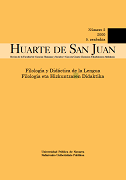Los hábitos de lectura y su relación con otras variables
Keywords:
Habits of reading, reading behaviour, fond of reading, readingAbstract
The present article has the aim of analyzing the habits of reading which were showed by students during a Navarra school random (cross-section example) which contains the different levels of our educative system: one hundred and seventy-four primary students, five hundred and thirty-six (compulsory) secondary students and three hundred and thirty-seven students of high school graduate, one thousand and forty-seven students from nine to seventeen years old, in all. All of them were provided in a collective way with a questionnaire about habits of reading, in their educative centres. Their fond of reading and their reading behaviour were the main variables analysed. Furthermore, it was evaluated other variables in order to know their relation with main variables: Watching television in a mode rare way, the encouragement of their parents and their teachers to read, the reading understanding and the oral understanding, their intellectual ability, the logical reasoning and the memory. The age and the sex of the participants were considered, too. After the statistical analyse, it was verified that the older the students are, the less habits of reading they have. Girls show more habits of reading than boys and it can be seen a correlation between the habits on reading and other variables: read understanding, watching television in a moderate way and the encouragement of the parents and teachers to read.
Downloads
References
BAMBERGER, R. (1975). La promoción e la lertura. Barcelona: Promoción Cultural S.A. y Ed. de la UNESCO.
BASANTA, R. (1993 ). En busca del lector. Infancia y Sociedad
BAUMANN, J.F. (1990). La comprensión lectora. Madrid: Aprendizaje-Visor.
BETTELHEIM; B. y ZELAN K. (1983). Aprender a leer. Barcelona: Grijalbo.
BRASLAVSKY, B. (1983). La lectura en la escuela. Buenos Aires: Kapelusz.
BRYANT, P. y BRADLEY, L. (1998). Problemas infantiles de lectura. Madrid: Alianza
CEDAN PAZOS, F. (1986). Medio siglo de libros infantiles y juveniles en España. Madrid: Fundación Germán Sánchez Ruipérez.
CANOVAS LEONHART, P. (1998). A los niños de Andorra les gusta (mucho) la lectura. Alacena, 10-12
CENTRO DE DOCUMENTACIÓN FUNDACIÓN GSR: 250 documentos para la animación, CLIJ, 17, 28-32
CHARMEUX, E. (1992). Cómo fomentar los hábitos de lectura. Barcelona: CEAC.
COLOMER, T. y CAMPS, A. (1996). Enseñar a leer, enseñar a comprender: Madrid: Celeste MEC.
CONQUET, A. (1987). Cómo leer mejor y más deprisa. Madrid: Ibérica Europea de Ediciones.
COOK-GUMPERZ, J. (1988). La construcción social de la alfabetización, Barcelona: Paidós/M.E.C.
EDITORIAL S.M. (1997). Prescripción de literatura infantil y juvenil en centros escolares. Madrid.
FERNANDEZ, I. IBIRICU, O. y OLEA, M.J. (en prensa). Cuestionario de Hábitos de Lectura. 2000. Pamplona.
FERREIRO, E. y TEBEROSKY, A (1979). ¿Qué está escrito en una oración escrita? Una respuesta evolutiva. Infancia y Aprendizaje, 5, 20-3 1.
FIJALKOW, J. (1989). Malos lectores ¿por que? Madrid: F. Germán Sánchez Ruipérez.
FIZ, M.R. GOICOECHEA, M.J. IBIRICU, O. y OLEA, M.J. (en prensa) La comprensión lectora y su repercusión en el rendimiento escolar. Revista Huarte de San Juan. Psicología, 8. Universidad Pública de Navarra
FOUCAMBERT, J. (1989). Cómo ser lector. Barcelona: Laia.
FREDERICKS, A. D. y TAYLOR, D. (1991). Los padres y la lectura. Un programa de trabajo. Madrid: Aprendizaje Visor/MEC.
GARCÍA GARRIDO y OTROS (1998). Diagnóstico del Sistema Educativo: La Escuela Secundaria Obligatoria. Madrid: Instituto Nacional de Calidad y Evaluación (INCE/MEC)
GARTON, A. y PRATT, CH. (1991). Aprendizaje y proceso de alfabetización. Barcelona: Paidós - MEC.
GEBNER, G. (1973). Teoría de la comunicación y sus implicaciones en la enseñanza. Educación Hoy, VoL V.
GONZALEZ, T. y MAÑA, T. A vueltas con la animación. CLIJ, 24, 24-28.
HAZARD, P. (1977). Los libros, los niños y los hombres. Barcelona: Ed. Juventud
INSTITUTO DE CREATIVIDAD E I NNOVACIONES EDUCATIVAS (1996). Estudio sobre hábitos lectores en niños/as de 8 a 14 años. Universidad de Valencia. Financiado por Ediciones S.M.
]OLIBERT, J. (1984). Former des enfants lecteurs. París: Hachette.
LIKERT, R. A. (1952). Technique for development of attitude scales. Educational and psychological measurement. 12, 313-315.
MCLANE, J.B. y MCNAMEE, G.D. (1999). Alfabetización temprana. Madrid: Morata.
M. DE CULTURA (1978). La realidad cultural de España. Madrid.
M. DE CULTURA (1980). El libro como vehículo cultural. Madrid.
MARTÍN DE DIOS, L. M. (1984). Estudio sobre actitudes y demandas culturales de una comarca de Castilla. Madrid: Fundación Germán Sánchez Ruipérez.
PÉREZ ALONSO-GETA, P. y OTROS (1993). Los valores de los niños españoles 1992. Madrid: Ediciones S.M.
PÉREZ RIOJA, J.A. (1988). La necesidad y el placer de leer. Madrid: Popular.
PUERTAS, M. (1995). El Fomento de la lectura como uno de los objetivos de las bibliotecas universitarias. La experiencia del fondo. UPC - Barcelona: Everest.
RAMIRO VALDERRAMA, M. y CELORRIO l BÁÑEZ, R. (1985). Actitudes y expectativas lectoras de la población infantil de la provincia de Soria. RICUS (Filología) IX, 123-164.
RECASENS, M. (1986 ). Cómo jugar con el lenguaje. Barcelona: CEAC.
SARTO, MARÍA M. (1986). Animación a la lectura. Madrid: S.M. Editores.
SAVATER, F. (1998). Artículo de opinión aparecido en Diario de Navarra. Pamplona
SMITH, F. (1983). Comprensión de la lectura. México: Trillas.
SOLÉ, l. (1992). Estrategias de lectura. Barcelona: Grao.
SPSS Inc. (1996). SPSS Base 7.0 for Windows. User's Guide. SPSS Chicago lnc.
STAIGER, RALPH C. (1979). Caminos que llevan a la lectura. París: UNESCO.
TONUCCI, F. El nacimiento del lector. CLIJ, 5, 8-13
TUCKER, N. (1985). El niño y el libro. México: Fondo de Cultura Económica.
VIGOTSKY, L. S. (1931/1978). Mind in Society . The Development of Higher Psychological Processes. Cambridge: Harvard University Press. (Trad. Cast. El desarrollo de los procesos psicológicos superiores. Barcelona: Crítica).
YUSTE, C. (1998). BADIG (Batería de aptitudes diferenciales y generales). Madrid: CEPE.
Downloads
Published
How to Cite
Issue
Section
License
All articles are published under a Creative Commons (BY-NC-ND 4.0) license. Each article will be assigned a DOI.
Authors retain copyright of their work and grant the journal the right to the first publication. Authors can sign additional agreements to non-exclusive distribution of the published version of the article (for example, in an institutional repository) as long as appropriate attribution to the original publication is provided. Articles can be uploaded to institutional repositories immediately after publication.
Electronic distribution of the articles (for example, academic social networks or personal webpages) is allowed and encouraged.
The journal reserves the right to publicise the work in social networks and other electronic means.







